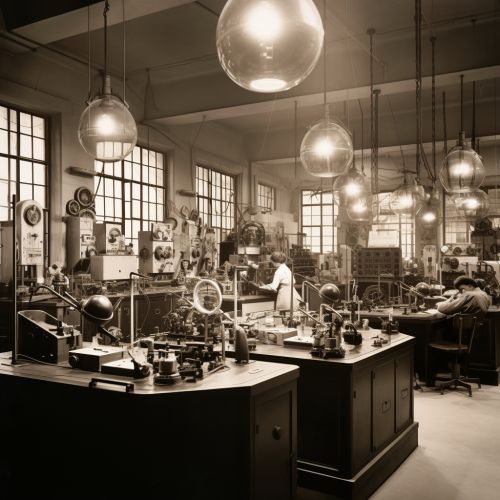Atomic Age
Introduction
The Atomic Age is a period in history that began on July 16, 1945, when the first nuclear weapon was detonated during the Trinity test in New Mexico. This era is characterized by the rapid development and proliferation of nuclear technology and the profound changes it brought to society, politics, and warfare.
Origins and Early Development
The Atomic Age can be traced back to the discovery of the atom and the understanding of its structure. The concept of the atom as an indivisible unit of matter was first proposed by ancient Greek philosophers, but it wasn't until the 19th and early 20th centuries that scientists began to understand its true nature. The work of scientists like J.J. Thomson, Ernest Rutherford, and Niels Bohr laid the groundwork for the development of nuclear technology.


In the 1930s and 1940s, the race to harness the power of the atom intensified. The discovery of nuclear fission by Otto Hahn and Fritz Strassmann in 1938 marked a significant turning point. This process, which involves splitting an atom's nucleus to release energy, provided the theoretical basis for the development of nuclear weapons and reactors.
The Manhattan Project
The Manhattan Project, a research and development project during World War II, marked the beginning of the Atomic Age. The project's goal was to develop the first nuclear weapons before Germany, which was also known to be conducting nuclear research. The Manhattan Project culminated in the Trinity test, the first successful detonation of a nuclear weapon, on July 16, 1945.
Impact on Warfare
The Atomic Age dramatically altered the nature of warfare. The use of nuclear weapons on the Japanese cities of Hiroshima and Nagasaki in August 1945 demonstrated their devastating power and marked the end of World War II. The development and proliferation of nuclear weapons during the Cold War led to a new era of military strategy, characterized by the doctrine of Mutually Assured Destruction (MAD).
Impact on Society and Culture
The Atomic Age also had profound effects on society and culture. The threat of nuclear war led to widespread fear and anxiety, reflected in popular culture through films, literature, and music. At the same time, the promise of nuclear power as a clean, abundant source of energy led to optimism about the future.
Nuclear Power
The development of nuclear power was a significant aspect of the Atomic Age. The first nuclear power plant was commissioned in the Soviet Union in 1954. Since then, nuclear power has become a major source of electricity worldwide, despite concerns about safety, waste disposal, and the potential for nuclear proliferation.
Legacy and Current Issues
The Atomic Age continues to influence the modern world. The legacy of nuclear weapons testing and the ongoing threat of nuclear warfare remain significant issues. The debate over the use of nuclear power, particularly in the wake of disasters like the Chernobyl disaster and the Fukushima Daiichi nuclear disaster, continues to shape energy policy.
